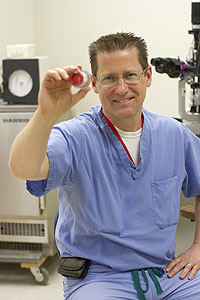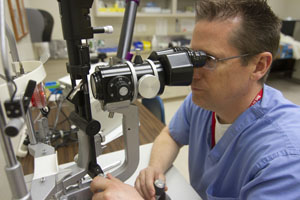Give the Gift of Sight: Be an Eye Donor

Because only the outermost portion of the eye is taken, corneal donors are able to be someone's miracle while their appearance is preserved.
Blind since birth, Lisa Johnson had more than 20 surgeries during her early childhood. When she turned 21, Johnson was given a new outlook on life when she received a successful cornea transplant through the Wisconsin Lions Eye Bank.
“It was amazing. There are no words to describe what that was like to see for the first time. It was so overwhelming, because I had so much to learn. Like what colors were and what my family members looked like,” Johnson said. “I thought I would have to live as a blind person forever. Instead I get to see the miracles of life, like my children being born.”
Anyone Can Help
Greg Oliver, Texas Tech Physicians Eye Clinic and executive director of the Great Plains Lions Eye Bank, said an eye bank obtains, medically evaluates and distributes corneas donated by individuals for use in corneal transplantation, research and education. U.S. eye banks provide tissue for an average of more than 59,000 corneal transplants a year.
“West Texans need to know that they have an eye bank and that we are helping scores of people every year,” Oliver said. “Last year we placed 182 corneas for transplant. But we need to educate everyone that there is no substitute for human corneas. If people don’t donate, then our patients cannot have their sight restored.”
Oliver said anyone can donate.
“The great thing about corneal tissue is that everyone is a universal donor. Your blood type does not have to match,” Oliver said. “It doesn’t matter how old you are, what color your eyes are or how good your eyesight is. Aside from those suffering from infections or a few highly communicable diseases such as HIV or hepatitis, most people are suitable donors.”

Oliver said there is no substitute for human corneas, and without donors, a patient's vision cannot be restored.
The cornea is the eye’s outermost layer. It is the clear, dome-shaped surface that covers the front of the eye. When the cornea becomes cloudy, light cannot penetrate the eye to reach the light-sensitive retina. Poor vision or blindness may result. Oliver said a corneal transplant involves replacing a diseased or scarred cornea with a new one.
An Unselfish Act
“I think one of the misconceptions people have is that their loved one’s appearance will be drastically altered after donation and they will not be able to have a viewing,” Oliver said. “We do not recover the whole eye. We only take the outermost portion, which contains the clear cornea. Great care is taken to preserve the donor’s appearance. When the donation is complete you cannot tell that we were there. The donor’s body is treated with respect at all times.”
The best way to sign up for donation is to visit www.donatelifetexas.org. The process is simple and will only take a couple of minutes. For more information on corneal donation or transplantation, contact Oliver at (806) 743-2242 or email gregory.oliver@ttuhsc.edu.
“People need to understand how brave and unselfish it is to donate,” Oliver said. “Brave and unselfish is not only a reference to the donor, but also to their loved ones who are left to deal with a loss and make the decision to donate. Through donation their loved one can truly be someone else’s miracle. They also need to know that too many West Texans are saying no to donation and we have to import corneas from other states as a result.”
Related Stories
Celebrating Veterans: TTUHSC’s General Martin Clay’s Legacy of Service and Leadership
From his initial enlistment in the Army National Guard 36 years ago to his leadership in military and civilian health care management roles, Major General Martin Clay’s career has been shaped by adaptability, mission focus and service to others.
Texas Tech University Health Sciences Center School of Nursing Named Best Accelerated Bachelor of Science in Nursing Program in Texas
The TTUHSC School of Nursing Accelerated Bachelor of Science in Nursing (BSN) program has been ranked the No. 1 accelerated nursing program in Texas by RegisteredNursing.org.
TTUHSC Names New Regional Dean for the School of Nursing
Louise Rice, DNP, RN, has been named regional dean of the TTUHSC School of Nursing on the Amarillo campus.
Recent Stories
National Academy of Inventors Names TTUHSC Faculty Senior Members
The National Academy of Inventors (NAI) has designated two current and one former TTUHSC faculty researchers as Senior Members.
The John Wayne Cancer Foundation Surgical Oncology Fellowship Program at Texas Tech University Health Sciences Center Announced
TTUHSC is collaborating with the John Wayne Cancer Foundation and has established the Big Cure Endowment, which supports the university’s efforts to reduce cancer incidence and increase survivability of people in rural and underserved areas.
TTUHSC Receives $1 Million Gift from Amarillo National Bank to Expand and Enhance Pediatric Care in the Panhandle
TTUHSC School of Medicine leaders accepted a $1 million philanthropic gift from Amarillo National Bank on Tuesday (Feb. 10), marking a transformational investment in pediatric care for the Texas Panhandle.
